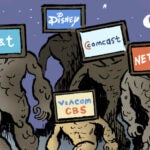BuzzFeed took another lap around its AI-related talking points as its advertising business took another lap around the drain.
The digital publishing company’s revenue has steadily declined since it went public at the end of 2021, which continued in its Q1 earnings report on Monday.
Ad revenue dropped 22% YOY to $21.4 million. Content revenue fell by 19% to $13.1 million. And commerce and other revenues were down 9% to $13.1 million.
It’s not looking great, though some of BuzzFeed’s investments in AI-generated content are bringing direct traffic back to its owned-and-operated properties and boosting programmatic demand.
CEO Jonah Peretti says BuzzFeed seeks to become the “defining media company for the AI era.” But he reiterated it’s “only at the start of this journey.”
Bottom line is: BuzzFeed needs to turn its revenue decline around if it wants to see those plans realized.
A Complex solution
Clearly, good news was in short supply in this earnings report.
As a bright point, Peretti highlighted that there’s now increased stability in BuzzFeed’s overall business … as a result of selling the Complex portfolio it acquired back in 2021.
BuzzFeed unloaded Complex – except for its First We Feast video brand – to ecommerce company NTWRK at a nearly $200 million loss in February.
Still, unloading Complex does remove an albatross from around BuzzFeed’s neck. Peretti had highlighted difficulties in unifying BuzzFeed’s and Complex’s sales teams in past earnings calls.
And that was corroborated by recent reporting from The Information that revealed Complex’s sales team bristled at being associated with the BuzzFeed brand, which it considered outdated and cringey.
Rerouting traffic
There may be something to the idea that BuzzFeed’s heyday is behind it, too.
BuzzFeed is still relevant among millennial audiences, who are no longer as young and hip as they once were. However, the brand also claims a strong following among Gen Z.
BuzzFeed touts time spent on its properties by Gen Z and millennial users as a major differentiator from other digital publishing giants. According to Comscore, these age groups spent 150 million hours on BuzzFeed’s properties in 2022. Which stacks up favorably to Dotdash Meredith’s 67 million or Vox Media and Condé Nast’s 60 million.
But those numbers might not look as favorable in 2024. Time spent across the BuzzFeed portfolio actually declined 16% in Q1 compared to the same period last year. This drop was primarily driven by “ongoing declines in referral traffic from third-party platforms,” said CFO Matt Omer.
While referral traffic is down, BuzzFeed is betting that generative AI-enabled experiences – like a tool that turns celebrities into Shrek-ified versions of themselves – will keep audiences coming to its sites.
And there was some positive momentum in that direction, as direct traffic to BuzzFeed’s properties increased 3% from Q4 to Q1. As of Q1, 90% of audience time spent engaging with BuzzFeed’s content happens on its owned-and-operated sites.
Monetization moves
Making money off that direct audience is a different story, though.
And although BuzzFeed’s overall ad revenue is still in a tailspin, its programmatic business is growing slightly, spurred by this increase in direct traffic.
Programmatic demand was up 6% YOY in Q1 for the flagship BuzzFeed site and news brand HuffPost, representing the third consecutive quarter of programmatic growth for these properties. This is especially encouraging, since programmatic is BuzzFeed’s highest-margin revenue stream, Omer said.
BuzzFeed expects to return to programmatic growth for its entire portfolio by next quarter, Omer said. By that point, it hopes to have made up for losses from last year’s shutdown of BuzzFeed News and Facebook Instant Articles. However, he added, “ongoing pressure” on direct sales and revenue from third-party platforms will continue to be a drag on overall revenues.
BuzzFeed also sees potential in furthering its retail media and affiliate marketing streams. It collected $80 million in revenue from retailer partners in FY 2023, nearly a third of its overall revenue.
This business is making gains by offering audience extension for retail media networks. And the need for off-platform audience extension will only become more pronounced as retail media demand grows, Peretti said.
“Retailers are looking off-site to fill ad units, and BuzzFeed is a natural destination because we are already an established partner,” he said.
Peretti also imagines AI will help BuzzFeed optimize its retail ad placements by recommending contextual adjacencies based on the content on-page and audience engagement trends.
He confirmed that BuzzFeed’s ad product road map includes further investments in using large language models to enhance “contextual positioning,” but did not confirm a timeline for future product announcements.
It’s another example of digital publishers looking to AI to enhance their contextual offerings. And another example of BuzzFeed putting all its eggs in the AI basket.















